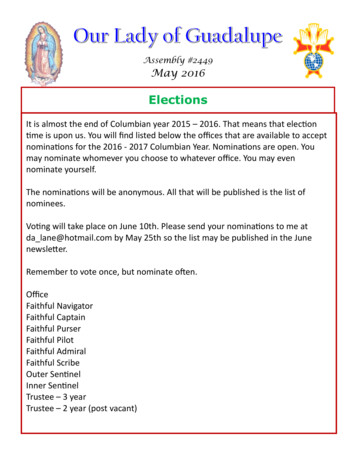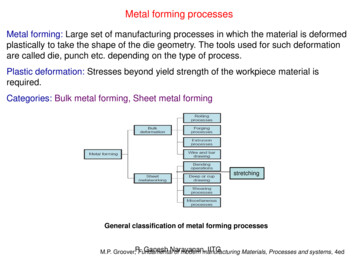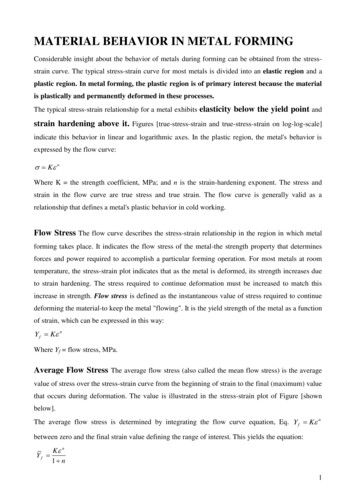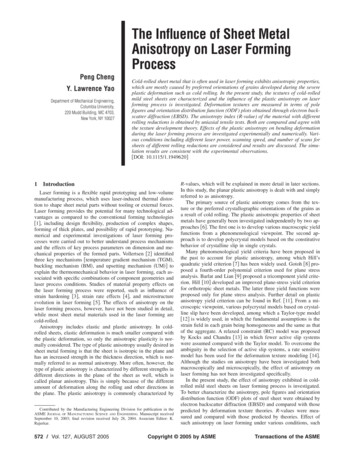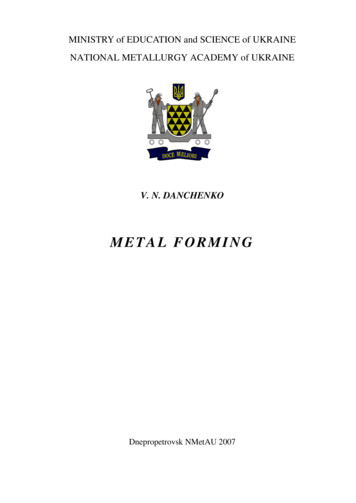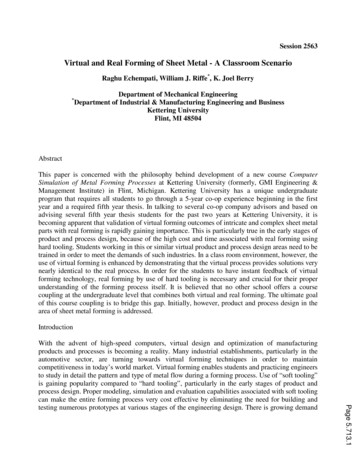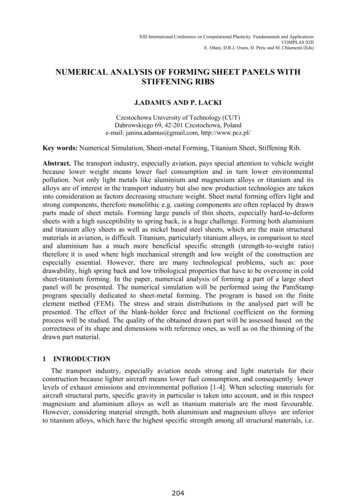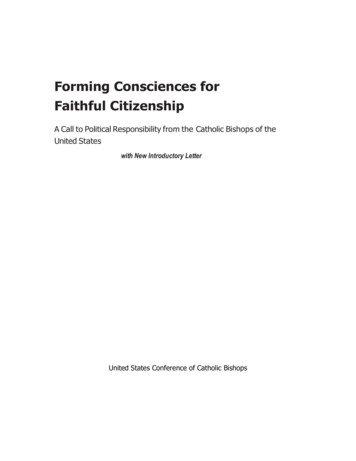
Transcription
Forming Consciences forFaithful CitizenshipA Call to Political Responsibility from the Catholic Bishops of theUnited Stateswith New Introductory LetterUnited States Conference of Catholic Bishops
The document Forming Consciences for Faithful Citizenship: A Call to Political Responsibility from theCatholic Bishops of the United States was developed by the chairmen, in consultation with themembership, of the Committees on Catholic Education, Communications, Cultural Diversity in theChurch, Doctrine, Domestic Justice and Human Development, Evangelization and Catechesis,International Justice and Peace, Migration, Pro-Life Activities; the Subcommittee for the Promotion andDefense of Marriage; and the Ad Hoc Committee for Religious Liberty of the United States Conferenceof Catholic Bishops (USCCB). It was approved by the full body of bishops at its November 2015 GeneralMeeting.A new Introductory Letter from the Catholic Bishops of the United States for Forming Consciences forFaithful Citizenship was developed by the chairmen, in consultation with the membership, of theCommittees on Catholic Education, Communications, Cultural Diversity in the Church, Doctrine,Domestic Justice and Human Development, Evangelization and Catechesis, International Justice andPeace, Laity, Marriage, Family Life and Youth, Migration, Pro-Life Activities; the Committee forReligious Liberty; the Subcommittee for the Promotion and Defense of Marriage; and the Ad HocCommittee Against Racism of the USCCB. The Introductory Letter was approved by the full body ofbishops at its November 2019 General Meeting.Both documents have been directed for publication by the undersigned.Msgr. J. Brian Bransfield General Secretary, USCCBExcerpts from the English translation of the Compendium of the Social Doctrine of the Church copyright 2004, Libreria Editrice Vaticana, Vatican City State. All rights reserved.Excerpts from the Congregation of the Doctrine of the Faith’s Doctrinal Note on Some QuestionsRegarding the Participation of Catholics in Political Life copyright 2002, Libreria Editrice Vaticana,Vatican City State. All rights reserved.Excerpts from Pope Paul VI’s World Day of Peace Message (1970) copyright Libreria EditriceVaticana, Vatican City State. All rights reserved.Excerpts from Pope John Paul II, Sollicitudo Rei Socialis (1987) and Evangelium Vitae (1995), copyright 2
Libreria Editrice Vaticana, Vatican City State. All rights reserved.Excerpts from Pope Benedict XVI, Caritas in Veritate (2009), Deus Caritas Est (2005), SacramentumCaritatis (2007), and Address, Jan. 19, 2013, copyright Libreria Editrice Vaticana, Vatican City State.All rights reserved.Excerpts from Pope Francis, Homily, June 30, 2014; Evangelii Gaudium (2013); Laudato Si’ (2015);Gaudete Et Exsultate (2018); Homily, Feb. 17, 2015; Message, April 20, 2015; General Audience, April15, 2015; Address, Nov. 17, 2014; and Address, Dec. 12, 2013, copyright Libreria Editrice Vaticana,Vatican City State. All rights reserved.Excerpts from Living the Gospel of Life copyright 1998, United States Conference of Catholic Bishops,Washington DC. All rights reserved.Excerpts from Gaudium et Spes and Dignitatis Humanae are taken from the Vatican website and copyright 1965, Libreria Editrice Vaticana (LEV), Vatican City State. Used with permission. All rights reserved.Excerpts from the Catechism of the Catholic Church, second edition, copyright 2000, Libreria EditriceVaticana–United States Conference of Catholic Bishops, Washington, DC. Used with permission. Allrights reserved.Scripture excerpts used in this work are taken from the New American Bible, Revised Edition, 2010,1991, 1986, 1970 Confraternity of Christian Doctrine, Inc., Washington, DC. All rights reserved. Usedwith permission. No part of the New American Bible may be reproduced in any form without permissionin writing from the copyright owner.Copyright 2007, 2011, 2015, 2019, United States Conference of Catholic Bishops, Washington DC.All rights reserved. No part of this work may be reproduced or transmitted in any form or by any means,electronic or mechanical, including photocopying, recording, or by any information storage and retrievalsystem, without permission in writing from the copyright holder.Digital Edition, February 20203
contentsIntroductory Letter . 6PART IForming Consciences for Faithful Citizenship:The US Bishops’ Reflection on Catholic Teaching and Political Life . 10Introduction. 10Why Does the Church Teach About Issues Affecting Public Policy? . 13Who in the Church Should Participate in Political Life? . 15How Does the Church Help the Catholic Faithful to Speak About Political and SocialQuestions? . 17A Well-Formed Conscience . 18The Virtue of Prudence . 18Doing Good and Avoiding Evil. 19Making Moral Choices . 21What Does the Church Say About Catholic Social Teaching in the Public Square?—FourPrinciples of Catholic Social Teaching . 24The Dignity of the Human Person . 25Subsidiarity . 26The Common Good . 26Solidarity . 29Conclusion . 30PART IIApplying Catholic Teaching to Major Issues: A Summary of Policy Positions of theUnited States Conference of Catholic Bishops . 32Human Life. 32Promoting Peace . 34Marriage and Family Life. 35Religious Freedom . 36Preferential Option for the Poor and Economic Justice . 36Health Care. 38Migration . 38Catholic Education . 39Promoting Justice and Countering Violence . 40Combatting Unjust Discrimination. 40Care for Our Common Home . 40Communications, Media, and Culture . 41Global Solidarity . 424
PART IIIGoals for Political Life: Challenges for Citizens, Candidates, and Public Officials . 44Notes . 46References . 47Major Catholic Statements on Public Life and Moral Issues . 49Protecting Human Life. 49Promoting Family Life . 50Pursuing Social Justice . 51Practicing Global Solidarity . 52Major Policy-Related Speeches of Pope Francis During His Apostolic Visit to the United States,September 22-27, 2015 . 535
Introductory LetterAs Catholics, we bring the richness of our faith to the public square. We draw from both faith and reasonas we seek to affirm the dignity of the human person and the common good of all. With renewed hope,we, the Catholic Bishops of the United States, are re-issuing Forming Consciences for FaithfulCitizenship, our teaching document on the political responsibility of Catholics, which provides guidancefor all who seek to exercise their rights and duties as citizens.Everyone living in this country is called to participate in public life and contribute to the commongood.1 In Rejoice and Be Glad [Gaudete et Exsultate], Pope Francis writes:Your identification with Christ and his will involves a commitment to build with him thatkingdom of love, justice and universal peace. . . .You cannot grow in holiness withoutcommitting yourself, body and soul, to giving your best to this endeavor.2The call to holiness, he writes, requires a “firm and passionate” defense of “the innocent unborn.”“Equally sacred,” he further states, are “the lives of the poor, those already born, the destitute, theabandoned and the underprivileged, the vulnerable infirm and elderly exposed to covert euthanasia, thevictims of human trafficking, new forms of slavery, and every form of rejection.”3Our approach to contemporary issues is first and foremost rooted in our identity as followers ofChrist and as brothers and sisters to all who are made in God’s image. For all Catholics, including thoseseeking public office, our participation in political parties or other groups to which we may belongshould be influenced by our faith, not the other way around.Our 2015 statement, Forming Consciences for Faithful Citizenship, sought to help Catholics formtheir consciences, apply a consistent moral framework to issues facing the nation and world, and shapetheir choices in elections in the light of Catholic Social Teaching. In choosing to re-issue this statement,we recognize that the thrust of the document and the challenges it addresses remain relevant today.At the same time, some challenges have become even more pronounced. Pope Francis hascontinued to draw attention to important issues such as migration, xenophobia, racism, abortion, globalconflict, and care for creation. In the United States and around the world, many challenges demandour attention.The threat of abortion remains our preeminent priority because it directly attacks life itself,4because it takes place within the sanctuary of the family, and because of the number of livesdestroyed. At the same time, we cannot dismiss or ignore other serious threats to human life and6
dignity such as racism, the environmental crisis, poverty and the death penalty.5Our efforts to protect the unborn remain as important as ever, for just as the Supreme Court mayallow greater latitude for state laws restricting abortion, state legislators have passed statutes not onlykeeping abortion legal through all nine months of pregnancy but opening the door to infanticide.Additionally, abortion contaminates many other important issues by being inserted into legislationregarding immigration, care for the poor, and health care reform.At our border, many arriving families endure separation, inhumane treatment, and lack of dueprocess, while those fleeing persecution and violence face heightened barriers to seeking refuge andasylum. Within our borders, Dreamers, Temporary Protected Status (TPS) holders, and mixed-status andundocumented families face continued fear and anxiety as political solutions fail to materialize.Lawmakers’ inability to pass comprehensive immigration reform which acknowledges the family as thebasic unit of society has contributed to the deterioration of conditions at the border. As we seek solutions,we must ensure that we receive refugees, asylum seekers, and other migrants in light of the teachings ofChrist and the Church while assuring the security of our citizens.The wound of racism continues to fester; the bishops of the United States drew attention to thisimportant topic in the recent pastoral letter, Open Wide Our Hearts. Religious freedom problemscontinue to intensify abroad and in the United States have moved beyond the federal to state andlocal levels. As international conflicts proliferate, addressing poverty and building global peace remainpressing concerns, as does the need to assist persons and families in our own country who continue tostruggle to make ends meet. We must work to address gun violence, xenophobia, capital punishment, andother issues that affect human life and dignity. It is also essential to affirm the nature of the human personas male and female, to protect the family based on marriage between a man and a woman, and to upholdthe rights of children in that regard. Finally, we must urgently find ways to care better for God’s creation,especially those most impacted by climate change—the poor—and protect our common home. We mustresist the throw-away culture and seek integral development for all.With these and other serious challenges facing both the nation and the Church, we are called towalk with those who suffer and to work toward justice and healing.At all levels of society, we are aware of a great need for leadership that models love forrighteousness (Wisdom 1:1) as well as the virtues of justice, prudence, courage, and temperance. Ourcommitment as people of faith to imitate Christ’s love and compassion should challenge us to serve asmodels of civil dialogue, especially in a context where discourse is eroding at all levels of society.Where we live, work, and worship, we strive to understand before seeking to be understood, to treat withrespect those with whom we disagree, to dismantle stereotypes, and to build productive conversation in7
place of vitriol.Catholics from every walk of life can bring their faith and our consistent moral framework tocontribute to important work in our communities, nation, and world on an ongoing basis, not just duringelection season. In this coming year and beyond, we urge leaders and all Catholics to respond in prayerand action to the call to faithful citizenship. In doing so, we live out the call to holiness and work withChrist as he builds his kingdom of love.Merciful Father,Thank you for inviting each of us to join in your workof building the kingdom of love, justice, and peace.Draw us close to you in prayeras we discern your call in our families and communities.Send us forth to encounter all whom you love:those not yet born, those in poverty, those in need of welcome.Inspire us to respond to the call to faithful citizenship,during election season and beyond.Help us to imitate your charity and compassionand to serve as models of loving dialogue.Teach us to treat others with respect, even when we disagree,and seek to share your love and mercy.We ask this through Jesus Christ our Lord, who lives and reigns with youin the unity of the Holy Spirit, one God forever and ever. Amen-----------8
1 Catechism of the Catholic Church, nos. 1913-15.2 Pope Francis, Gaudete et Exsultate, no. 25.3 Ibid, no. 101.4 Forming Consciences for Faithful Citizenship, no. 22.5 Forming Consciences for Faithful Citizenship, no. 29.9
PART IForming Consciences for Faithful Citizenship: TheUS Bishops’ Reflection on Catholic Teaching andPolitical LifeIntroductionOur redemption has a social dimension because “God, in Christ, redeems not only the individualperson, but also . . . social relations.” To believe that the Holy Spirit is at work in everyone meansrealizing that he seeks to penetrate every human situation and all social bonds. Accepting the firstproclamation, which invites us to receive God’s love and to love him in return with the very love whichis his gift, brings forth in our lives and actions a primary and fundamental response: to desire, seekand protect the good of others.(Pope Francis, Evangelii Gaudium, no. 178)1. As a nation, we share many blessings and strengths, including a tradition of religious freedom andpolitical participation. However, as a people, we face serious challenges that are both political and moral.This has always been so and as Catholics we are called to participate in public life in a manner consistentwith the mission of our Lord, a mission that he has called us to share. As Pope Francis teaches,An authentic faith . . . always involves a deep desire to change the world, to transmit values, toleave this earth somehow better than we found it. We love this magnificent planet on whichGod has put us, and we love the human family which dwells here, with all its tragedies andstruggles, it hopes and aspirations, its strengths and weaknesses. The earth is our commonhome and all of us are brothers and sisters. If indeed “the just ordering of society and of thestate is a central responsibility of politics,” the Church, “cannot and must not remain on thesidelines in the fight for justice.” (Evangelii Gaudium, no. 183)In this fight for justice, God gives us a special gift, hope, which Pope Benedict describes in Caritas inVeritate as “burst[ing] into our lives as something not due to us, something that transcends every law of10
justice” (no. 34). Thus we take up the task of serving the common good with joy and hope, confident thatGod, who “so loved the world that he gave his only Son,” walks with us and strengthens us on the way(Jn 3:16). God is love, and he desires that we help to build a “civilization of love”—one in which allhuman beings have the freedom and opportunity to experience the love of God and live out that love bymaking a free gift of themselves to one another. Pope Francis encourages us in Evangelii Gaudium tomeditate on theinseparable bond between our acceptance of the message of salvation and genuine fraternallove . . . God’s word teaches that our brothers and sisters are the prolongation of theincarnation for each of us: “As you did it to one of these, the least of my brethren, you did it tome” (Mt 25:40). The way we treat others has a transcendent dimension: “The measure yougive will be the measure you get” (Mt 7:2). It corresponds to the mercy which God has shownus: “Be merciful, just as your Father is merciful. Do not judge, and you will not be judged; donot condemn, and you will not be condemned. Forgive, and you will be forgiven; give, and itwill be given to you . . . For the measure you give will be the measure you get back” (Lk 6:3638). What these passages make clear is the absolute priority of “going forth from ourselvestoward our brothers and sisters” as one of the two great commandments which ground everymoral norm and as the clearest sign for discerning spiritual growth in response to God’scompletely free gift. (no. 179)Love compels us “to ‘go into all the world and proclaim the good news to the whole creation’ (Mk16:15)” (Evangelii Gaudium, no. 181). “Here,” Pope Francis continues, “‘the creation’ refers to everyaspect of human life; consequently, ‘the mission of proclaiming the good news of Jesus Christ has auniversal destination. Its mandate of charity encompasses all dimensions of existence, all individuals, allareas of community life, and all peoples. Nothing human can be alien to it’” (Evangelii Gaudium, no.181). This “mandate” includes our engagement in political life.2. The political realities of our nation present us with opportunities and challenges. We are a nationfounded on “life, liberty, and the pursuit of happiness,” but the right to life itself is not fully protected,especially for unborn children, the terminally ill, and the elderly, the most vulnerable members of theAmerican family. We are called to be peacemakers in a nation at war. We are a country pledged to pursue“liberty and justice for all,” but we are too often divided across lines of race, ethnicity, and economicinequality. We are a nation of immigrants, struggling to address the challenges of many new immigrants11
in our midst. We are a society built on the strength of our families, called to defend marriage and offermoral and economic supports for family life. We are a powerful nation in a violent world, confrontingterror and trying to build a safer, more just, more peaceful world. We are an affluent society wheretoo many live in poverty and lack health care and other necessities of life. We are part of a globalcommunity charged with being good stewards of the earth’s environment, what Pope Francis calls “ourcommon home,” which is being threatened. These challenges are at the heart of public life and at thecenter of the pursuit of the common good.1 They are intertwined and inseparable. As Pope Francis hasinsisted, “We are faced . . . with one complex crisis which is both social and environmental. Strategiesfor a solution demand an integrated approach to combating poverty, restoring dignity to the excluded,and at the same time protecting nature” (Laudato Si’, no. 139).3. For many years, we bishops of the United States have sought to share Catholic teaching on social andpolitical life. We have done so in a series of statements issued every four years focused on “politicalresponsibility” or “faithful citizenship.” In this document we continue that practice, maintainingcontinuity with what we have said in the past in light of new challenges facing our nation and world. Thisis not new teaching but affirms what is taught by our bishops’ conference and the whole Church.4. As Catholics, we are part of a community with a rich heritage that helps us consider the challenges inpublic life and contribute to greater justice and peace for all people. Part of that rich heritage on faithfulcitizenship is the teaching of Vatican Council II’s Declaration on Religious Liberty (DignitatisHumanae). It says that “society itself may profit by the moral qualities of justice and peace which havetheir origin in [people’s] faithfulness to God and to His holy will” (no. 6). The work for justice requiresthat the mind and the heart of Catholics be educated and formed to know and practice the whole faith.5. This statement highlights the role of the Church in the formation of conscience and the correspondingmoral responsibility of each Catholic to hear, receive, and act upon the Church’s teaching in the lifelongtask of forming his or her own conscience. Foremost amongst those teachings are the four basicprinciples of Catholic social doctrine: the dignity of the human person, the common good, subsidiarity,and solidarity (Compendium of the Social Doctrine of the Church, no. 160). With this foundation,Catholics are better able to evaluate policy positions, party platforms, and candidates’ promises andactions in light of the Gospel and the moral and social teaching of the Church in order to help build abetter world.12
6. We seek to do this by addressing four questions: (1) Why does the Church teach about issuesaffecting public policy? (2) Who in the Church should participate in political life? (3) How does theChurch help the Catholic faithful to speak about political and social questions? (4) What does theChurch say about Catholic social teaching in the public square?7. In this statement, we bishops do not intend to tell Catholics for whom or against whom to vote.Our purpose is to help Catholics form their consciences in accordance with God’s truth. We recognizethat the responsibility to make choices in political life rests with each individual in light of a properlyformed conscience, and that participation goes well beyond casting a vote in a particular election.8. During election years, there may be many handouts and voter guides that are produced and distributed.We encourage Catholics to seek those resources authorized by their own bishops, their state Catholicconferences, and the United States Conference of Catholic Bishops. This statement is intended to reflectand complement, not substitute for, the ongoing teaching of bishops in our own dioceses and states. Whenusing this document, it is important to remember that Church teaching is coherent and rests on acomprehensive vision of the dignity of the human person, a dignity that St. John Paul II described as“manifested in all its radiance when the person’s origin and destiny are considered: created by God in hisimage and likeness as well as redeemed by the most precious blood of Christ, the person is called to be a‘child in the Son’ and a living temple of the Spirit, destined for the eternal life of blessed communion withGod” (Christifideles Laici, no. 37). Thus, the particular judgments of the document may fall at variouspoints along the political spectrum, but the foundational principles that guide these teachings should notbe ignored in any case nor used selectively in order to serve partisan interests. In light of these reflectionsand those of local bishops, we encourage Catholics throughout the United States to be active in thepolitical process, particularly in these challenging times.Why Does the Church Teach About Issues Affecting Public Policy?The Church’s teachings concerning contingent situations are subject to new and further developmentsand can be open to discussion, yet we cannot help but be concrete—without presuming to enter intodetails—lest the great social principles remain mere generalities which challenge no one. . . . TheChurch’s pastors, taking into account the contributions of the different sciences, have the right to offeropinions in all that affects people’s lives, since the task of evangelization implies and demands theintegral promotion of each human being.13
(Pope Francis, Evangelii Gaudium, no. 182)9. The Church’s obligation to participate in shaping the moral character of society is a requirement of ourfaith. It is a basic part of the mission we have received from Jesus Christ, who offers a vision of liferevealed to us in Sacred Scripture and Tradition. To echo the teaching of the Second Vatican Council:Christ, the Word made flesh, in showing us the Father’s love, also shows us what it truly means to behuman (see Gaudium et Spes, no. 22). Christ’s love for us lets us see our human dignity in full clarity andcompels us to love our neighbors as he has loved us. Christ, the Teacher, shows us what is true and good,that is, what is in accord with our human nature as free, intelligent beings created in God’s image andlikeness and endowed by the Creator with dignity and rights as well as duties.Christ also reveals to us the weaknesses that are part of all human endeavors. In the language ofrevelation, we are confronted with sin, both personal and structural. “The Church’s wisdom,” accordingto Pope Benedict XVI, “has always pointed to the presence of original sin in social conditions and in thestructure of society” (Caritas in Veritate, no. 34). All “structures of sin,” as St. John Paul II calls them,“are rooted in personal sin, and thus always linked to the concrete acts of individuals who introduce thesestructures, consolidate them and make them difficult to remove” (Sollicitudo Rei Socialis, no. 36). Thus,our faith helps us understand that the pursuit of a civilization of love must address our own failures andthe ways in which these failures distort the broader ordering of the society in which we live. In the wordsof the Catechism of the Catholic Church, “Ignorance of the fact that man has a wounded nature inclinedto evil gives rise to serious errors in the areas of education, politics, social action and morals” (no. 407).As Pope Francis, quoting Pope Benedict XVI, reaffirmed in Evangelii Gaudium, “We need to beconvinced that charity ‘is the principle not only of micro-relationships (with friends, with familymembers or within small groups) but also of macro-relationships (social, economic and political ones)’”(no. 205).10. What faith teaches about the dignity of the human person, about the sacredness of every human life,and about humanity’s strengths and weaknesses helps us see more clearly the same truths that also cometo us through the gift of human reason. At the center of these truths is respect for the dignity of everyperson. This is the core of Catholic moral and social teaching. Because we are people of both faith andreason, it is appropriate and necessary for
International Justice and Peace, Migration, Pro-Life Activities; the Subcommittee for the Promotion and Defense of Marriage; and the Ad Hoc Committee for Religious Liberty of the United States Conference of Catholic Bishops (USCCB). It was approved by the full body of bishops at its November 2015 General Meeting.
